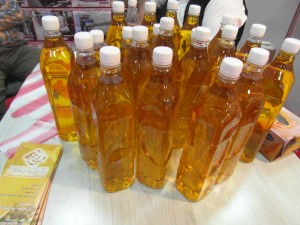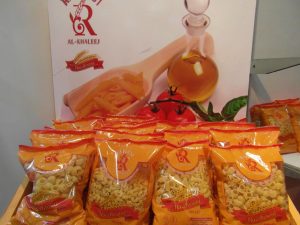By Nihal Zaroug and Reem Tombokti.
 Tripoli, 19 June 2013:
Tripoli, 19 June 2013:
The Libyan Food Expo at Tripoli International Fair was still active yesterday, its third day, with exhibitors welcoming visitors to see and sample products.
At the Libyan producers pavilion, Hamid Taher, enthusiastically invited the Libya Herald to taste the “best olive oil in Libya.” The southern producer owns 3,500 olive trees is Sabha, where he picks olives off his farm and sends it to be pressed in Samnou, an area in close proximity to Sabha. The quality of Libyan olive oil claims Taher, is better than the Tunisian oil sold in Libya, as it is only pressed once.
However, despite the claim of superior quality of oil, Taher has not been able to secure sales outside of Libya, and adds that competing locally with Tunisian olive oil has not been easy. To create employment and encourage local olive oil producers, he believes that only Libyan oil should be sold in the country.
A statement repeated to the Libya Herald in a discussion with Basher Hadya, the head of studies and researchers department at the Libyan Export Promotion Center (LEPC). Similar to Taher, Basher believes that Libyan olive oil, and dates should have no foreign competition.
Libya has an abundance of both and at times, farmers have been forced to scrap produce due to a lack of buyers. Hayda states, by some estimates there is over 22 million liters of local olive oil during high season but vast quantities of it do not make it on supermarket shelves.
Enforcing a ban on imported olive oil and dates, as a measure to promote local produce, is a policy the Government should adopt, says Hayda. He adds, that for Libyan products to be successful on local and foreign markets, the Government must provide more support to growers and manufactures. However, locals businesses are looking for more than monetary aid and subsidies, they also need direction and capacity building, concludes Hadya.
The LEPC handles portfolios of around 600 companies, and within the food industry, it works to assist not only olive oil and date producers, but also honey, fish and traditional goods producers. The Center’s main role is to help source local buyers and foreign markets but also provides a spectrum of other services including assisting in participation of international fairs, quality certification and business development.

Libyan pasta maker Rawasi, was being less reliant on the services of LEPC. It currently operates a plant in Tripoli’s Tajoura area and imports all its raw ingredients from Italy. Rawasi plans to open a second factory in Benghazi to solely manufacture a variety of spaghettis. It currently makes 14 different kinds of pasta at its Tripoli plant. The company has been operational since the end of the revolution but will start store sales in Libya during Ramadan. Unlike other local producers at the expo, the pasta manufacturer is already selling its products abroad in Chad and Niger.
Alruttab Sons have yet to export large quantities of their premium honey. Despite having a wide variety of honey and honey bi-products, Ahmed Salem, tells Libya Herald, only a few kilos of honey have been sold in Saudi Arabia, Egypt and Palestine. Such small quantities, says LPTEC ‘s head of studies and researches, are not significant and are typically intended for promotional use.
In Libya, Alruttab Sons is well established and as we spoke with Salem, visitors stopped and bought jars of Sidr (Lote tree) honey valued at 20 dinars per kilo. Sidr honey is known for its taste and medicinal properties, and Salem expects honey sales to continue rising during Ramadan. Asked if the recent fires in Emsallata and Jabel Al-Akdar, two areas where Alruttab harvests honey, affected their operations, Salem said lowered honey output was due to bad weather conditions and other circumstances unrelated to the devastating fires.
For Czech breakfast cereal manufactures Emco, the Libyan market is looking promising. Based on the success of Emco in Morocco and Egypt, senior export manager Ludek Spejzl, believes cereal sales in Libya will be rewarding. Initial market testing in Tripoli, Benghazi and Misrata, indicate enthusiasm for their product, as they are competitively priced and of a quality comparable to the top brands currently sold, says Spejzl. Emco has opted to use the port of Misrata, instead of the congested port of Tripoli to import their goods.
V&F Portelli, a Maltese company exhibiting organic foods, beverages and snacks for children, is looking to introduce Organix to the Libyan market for the first time. The novel products have been embraced by hospital chief Ali Emgadmy, says Mario Portelli, particularly the gluten free range, as there is a lack of choice for kids. Portelli, adds that all of Organix’s products are naturally coloured, flavored, sugar free or have no added salt. With a rise in child obesity rates, Organix may be just what the doctor ordered.
The Libyan Food Expo started on 16 June and ends today.
libya herald

Libyan
olive oil producers claim their oil is better quality than Tunisian
oil, but that they lack the marketing experience to export it (Photo:
Sami Zaptia).
The Libyan Food Expo at Tripoli International Fair was still active yesterday, its third day, with exhibitors welcoming visitors to see and sample products.
At the Libyan producers pavilion, Hamid Taher, enthusiastically invited the Libya Herald to taste the “best olive oil in Libya.” The southern producer owns 3,500 olive trees is Sabha, where he picks olives off his farm and sends it to be pressed in Samnou, an area in close proximity to Sabha. The quality of Libyan olive oil claims Taher, is better than the Tunisian oil sold in Libya, as it is only pressed once.
However, despite the claim of superior quality of oil, Taher has not been able to secure sales outside of Libya, and adds that competing locally with Tunisian olive oil has not been easy. To create employment and encourage local olive oil producers, he believes that only Libyan oil should be sold in the country.
A statement repeated to the Libya Herald in a discussion with Basher Hadya, the head of studies and researchers department at the Libyan Export Promotion Center (LEPC). Similar to Taher, Basher believes that Libyan olive oil, and dates should have no foreign competition.
Libya has an abundance of both and at times, farmers have been forced to scrap produce due to a lack of buyers. Hayda states, by some estimates there is over 22 million liters of local olive oil during high season but vast quantities of it do not make it on supermarket shelves.
Enforcing a ban on imported olive oil and dates, as a measure to promote local produce, is a policy the Government should adopt, says Hayda. He adds, that for Libyan products to be successful on local and foreign markets, the Government must provide more support to growers and manufactures. However, locals businesses are looking for more than monetary aid and subsidies, they also need direction and capacity building, concludes Hadya.
The LEPC handles portfolios of around 600 companies, and within the food industry, it works to assist not only olive oil and date producers, but also honey, fish and traditional goods producers. The Center’s main role is to help source local buyers and foreign markets but also provides a spectrum of other services including assisting in participation of international fairs, quality certification and business development.

Rawasi
brand Libyan pasta manufacturer said that they were already exporting
and were about to open a new factory (Photo: Sami Zaptia).
Libyan pasta maker Rawasi, was being less reliant on the services of LEPC. It currently operates a plant in Tripoli’s Tajoura area and imports all its raw ingredients from Italy. Rawasi plans to open a second factory in Benghazi to solely manufacture a variety of spaghettis. It currently makes 14 different kinds of pasta at its Tripoli plant. The company has been operational since the end of the revolution but will start store sales in Libya during Ramadan. Unlike other local producers at the expo, the pasta manufacturer is already selling its products abroad in Chad and Niger.
Alruttab Sons have yet to export large quantities of their premium honey. Despite having a wide variety of honey and honey bi-products, Ahmed Salem, tells Libya Herald, only a few kilos of honey have been sold in Saudi Arabia, Egypt and Palestine. Such small quantities, says LPTEC ‘s head of studies and researches, are not significant and are typically intended for promotional use.
In Libya, Alruttab Sons is well established and as we spoke with Salem, visitors stopped and bought jars of Sidr (Lote tree) honey valued at 20 dinars per kilo. Sidr honey is known for its taste and medicinal properties, and Salem expects honey sales to continue rising during Ramadan. Asked if the recent fires in Emsallata and Jabel Al-Akdar, two areas where Alruttab harvests honey, affected their operations, Salem said lowered honey output was due to bad weather conditions and other circumstances unrelated to the devastating fires.
For Czech breakfast cereal manufactures Emco, the Libyan market is looking promising. Based on the success of Emco in Morocco and Egypt, senior export manager Ludek Spejzl, believes cereal sales in Libya will be rewarding. Initial market testing in Tripoli, Benghazi and Misrata, indicate enthusiasm for their product, as they are competitively priced and of a quality comparable to the top brands currently sold, says Spejzl. Emco has opted to use the port of Misrata, instead of the congested port of Tripoli to import their goods.
V&F Portelli, a Maltese company exhibiting organic foods, beverages and snacks for children, is looking to introduce Organix to the Libyan market for the first time. The novel products have been embraced by hospital chief Ali Emgadmy, says Mario Portelli, particularly the gluten free range, as there is a lack of choice for kids. Portelli, adds that all of Organix’s products are naturally coloured, flavored, sugar free or have no added salt. With a rise in child obesity rates, Organix may be just what the doctor ordered.
The Libyan Food Expo started on 16 June and ends today.
libya herald
ليست هناك تعليقات:
إرسال تعليق